MBA600 Reflective Essay: Capstone Learning, Skills, and Career Impact
VerifiedAdded on 2022/11/15
|10
|3211
|398
Essay
AI Summary
This reflective essay, written by an MBA student, synthesizes the learning acquired from the MBA600 capstone subject. The essay details the application of theoretical and practical skills learned throughout the Master's qualification, focusing on interactive discussions, assessments, and case studies. It reflects on the development of theoretical, practical, applied, and reflective skills within the KDB framework. The essay also discusses the consultancy research process, including data analysis and research methods, and how these skills will be beneficial in future career endeavors, particularly in roles requiring strategic thinking and effective business management. The essay concludes with a discussion on the usefulness of developed skills in future career endeavors.
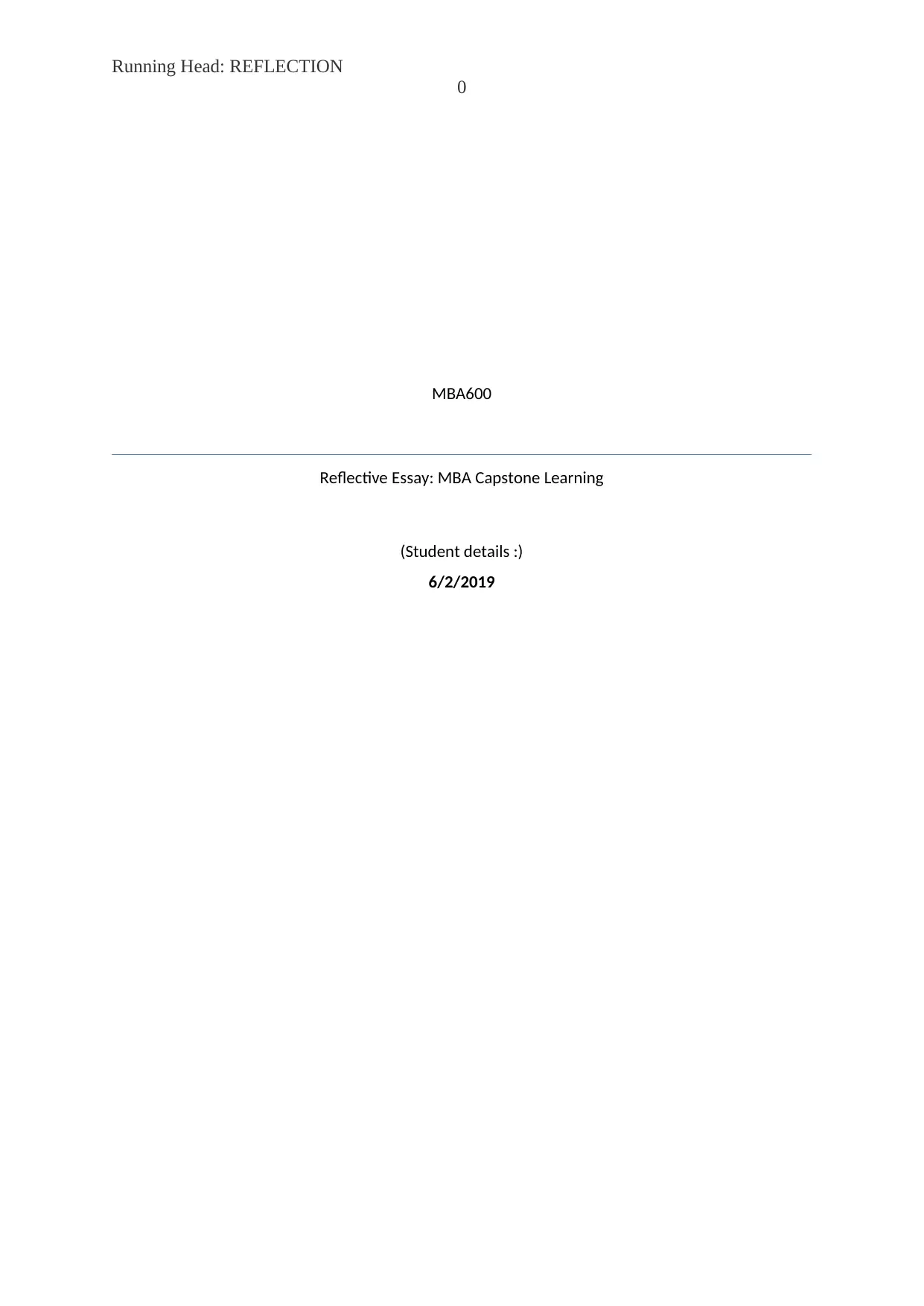
Running Head: REFLECTION
0
MBA600
Reflective Essay: MBA Capstone Learning
(Student details :)
6/2/2019
0
MBA600
Reflective Essay: MBA Capstone Learning
(Student details :)
6/2/2019
Paraphrase This Document
Need a fresh take? Get an instant paraphrase of this document with our AI Paraphraser
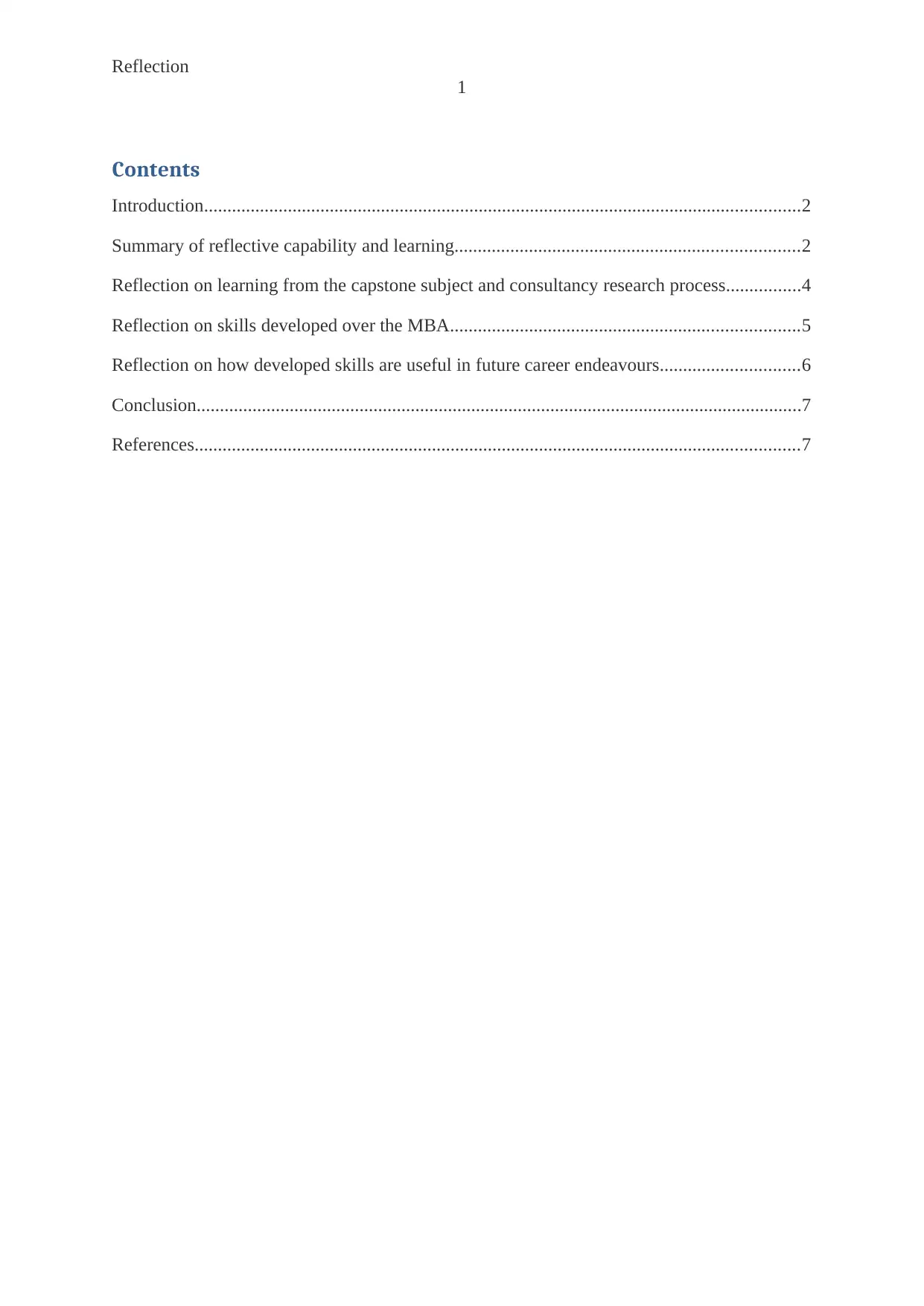
Reflection
1
Contents
Introduction................................................................................................................................2
Summary of reflective capability and learning..........................................................................2
Reflection on learning from the capstone subject and consultancy research process................4
Reflection on skills developed over the MBA...........................................................................5
Reflection on how developed skills are useful in future career endeavours..............................6
Conclusion..................................................................................................................................7
References..................................................................................................................................7
1
Contents
Introduction................................................................................................................................2
Summary of reflective capability and learning..........................................................................2
Reflection on learning from the capstone subject and consultancy research process................4
Reflection on skills developed over the MBA...........................................................................5
Reflection on how developed skills are useful in future career endeavours..............................6
Conclusion..................................................................................................................................7
References..................................................................................................................................7
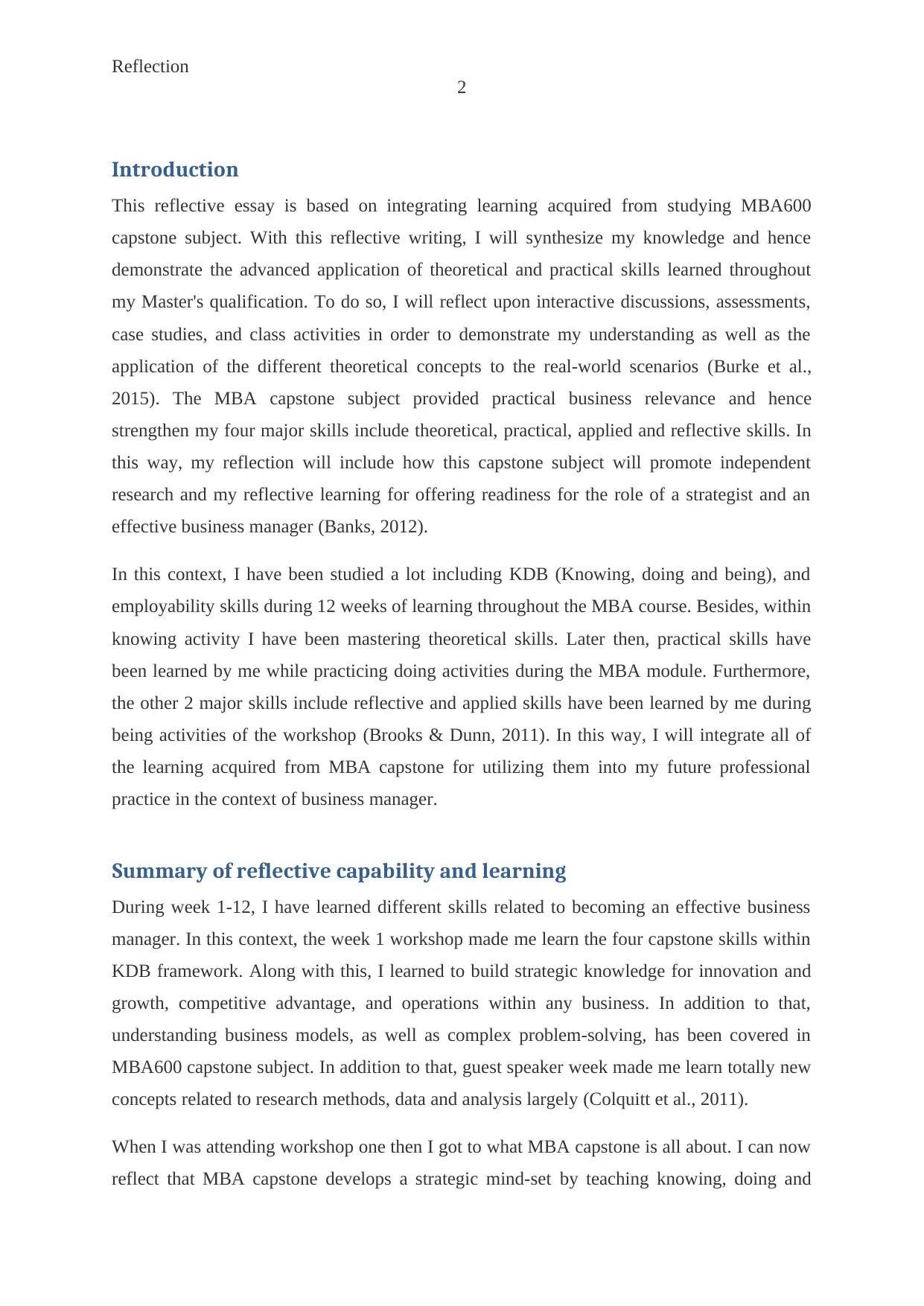
Reflection
2
Introduction
This reflective essay is based on integrating learning acquired from studying MBA600
capstone subject. With this reflective writing, I will synthesize my knowledge and hence
demonstrate the advanced application of theoretical and practical skills learned throughout
my Master's qualification. To do so, I will reflect upon interactive discussions, assessments,
case studies, and class activities in order to demonstrate my understanding as well as the
application of the different theoretical concepts to the real-world scenarios (Burke et al.,
2015). The MBA capstone subject provided practical business relevance and hence
strengthen my four major skills include theoretical, practical, applied and reflective skills. In
this way, my reflection will include how this capstone subject will promote independent
research and my reflective learning for offering readiness for the role of a strategist and an
effective business manager (Banks, 2012).
In this context, I have been studied a lot including KDB (Knowing, doing and being), and
employability skills during 12 weeks of learning throughout the MBA course. Besides, within
knowing activity I have been mastering theoretical skills. Later then, practical skills have
been learned by me while practicing doing activities during the MBA module. Furthermore,
the other 2 major skills include reflective and applied skills have been learned by me during
being activities of the workshop (Brooks & Dunn, 2011). In this way, I will integrate all of
the learning acquired from MBA capstone for utilizing them into my future professional
practice in the context of business manager.
Summary of reflective capability and learning
During week 1-12, I have learned different skills related to becoming an effective business
manager. In this context, the week 1 workshop made me learn the four capstone skills within
KDB framework. Along with this, I learned to build strategic knowledge for innovation and
growth, competitive advantage, and operations within any business. In addition to that,
understanding business models, as well as complex problem-solving, has been covered in
MBA600 capstone subject. In addition to that, guest speaker week made me learn totally new
concepts related to research methods, data and analysis largely (Colquitt et al., 2011).
When I was attending workshop one then I got to what MBA capstone is all about. I can now
reflect that MBA capstone develops a strategic mind-set by teaching knowing, doing and
2
Introduction
This reflective essay is based on integrating learning acquired from studying MBA600
capstone subject. With this reflective writing, I will synthesize my knowledge and hence
demonstrate the advanced application of theoretical and practical skills learned throughout
my Master's qualification. To do so, I will reflect upon interactive discussions, assessments,
case studies, and class activities in order to demonstrate my understanding as well as the
application of the different theoretical concepts to the real-world scenarios (Burke et al.,
2015). The MBA capstone subject provided practical business relevance and hence
strengthen my four major skills include theoretical, practical, applied and reflective skills. In
this way, my reflection will include how this capstone subject will promote independent
research and my reflective learning for offering readiness for the role of a strategist and an
effective business manager (Banks, 2012).
In this context, I have been studied a lot including KDB (Knowing, doing and being), and
employability skills during 12 weeks of learning throughout the MBA course. Besides, within
knowing activity I have been mastering theoretical skills. Later then, practical skills have
been learned by me while practicing doing activities during the MBA module. Furthermore,
the other 2 major skills include reflective and applied skills have been learned by me during
being activities of the workshop (Brooks & Dunn, 2011). In this way, I will integrate all of
the learning acquired from MBA capstone for utilizing them into my future professional
practice in the context of business manager.
Summary of reflective capability and learning
During week 1-12, I have learned different skills related to becoming an effective business
manager. In this context, the week 1 workshop made me learn the four capstone skills within
KDB framework. Along with this, I learned to build strategic knowledge for innovation and
growth, competitive advantage, and operations within any business. In addition to that,
understanding business models, as well as complex problem-solving, has been covered in
MBA600 capstone subject. In addition to that, guest speaker week made me learn totally new
concepts related to research methods, data and analysis largely (Colquitt et al., 2011).
When I was attending workshop one then I got to what MBA capstone is all about. I can now
reflect that MBA capstone develops a strategic mind-set by teaching knowing, doing and
⊘ This is a preview!⊘
Do you want full access?
Subscribe today to unlock all pages.

Trusted by 1+ million students worldwide
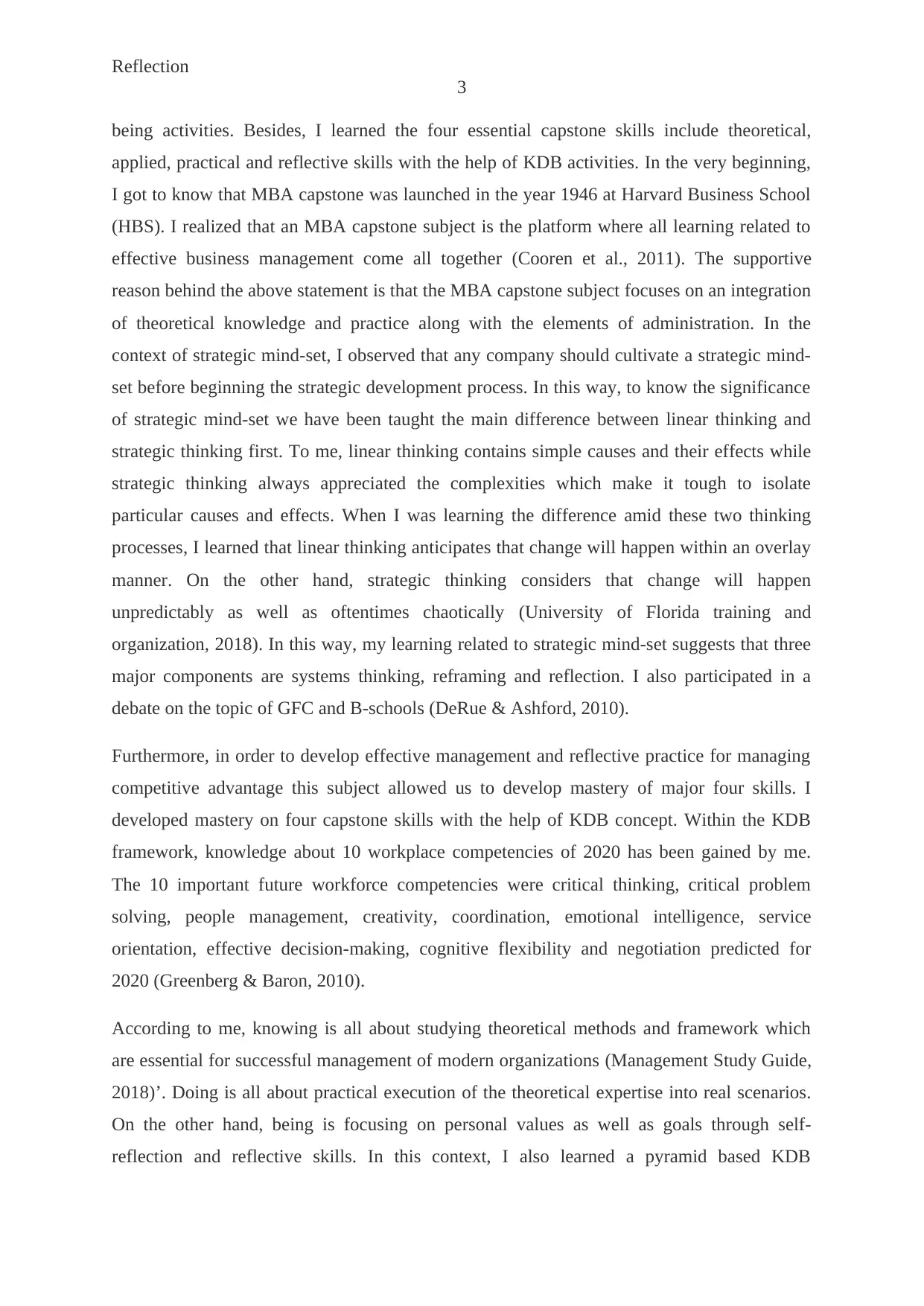
Reflection
3
being activities. Besides, I learned the four essential capstone skills include theoretical,
applied, practical and reflective skills with the help of KDB activities. In the very beginning,
I got to know that MBA capstone was launched in the year 1946 at Harvard Business School
(HBS). I realized that an MBA capstone subject is the platform where all learning related to
effective business management come all together (Cooren et al., 2011). The supportive
reason behind the above statement is that the MBA capstone subject focuses on an integration
of theoretical knowledge and practice along with the elements of administration. In the
context of strategic mind-set, I observed that any company should cultivate a strategic mind-
set before beginning the strategic development process. In this way, to know the significance
of strategic mind-set we have been taught the main difference between linear thinking and
strategic thinking first. To me, linear thinking contains simple causes and their effects while
strategic thinking always appreciated the complexities which make it tough to isolate
particular causes and effects. When I was learning the difference amid these two thinking
processes, I learned that linear thinking anticipates that change will happen within an overlay
manner. On the other hand, strategic thinking considers that change will happen
unpredictably as well as oftentimes chaotically (University of Florida training and
organization, 2018). In this way, my learning related to strategic mind-set suggests that three
major components are systems thinking, reframing and reflection. I also participated in a
debate on the topic of GFC and B-schools (DeRue & Ashford, 2010).
Furthermore, in order to develop effective management and reflective practice for managing
competitive advantage this subject allowed us to develop mastery of major four skills. I
developed mastery on four capstone skills with the help of KDB concept. Within the KDB
framework, knowledge about 10 workplace competencies of 2020 has been gained by me.
The 10 important future workforce competencies were critical thinking, critical problem
solving, people management, creativity, coordination, emotional intelligence, service
orientation, effective decision-making, cognitive flexibility and negotiation predicted for
2020 (Greenberg & Baron, 2010).
According to me, knowing is all about studying theoretical methods and framework which
are essential for successful management of modern organizations (Management Study Guide,
2018)’. Doing is all about practical execution of the theoretical expertise into real scenarios.
On the other hand, being is focusing on personal values as well as goals through self-
reflection and reflective skills. In this context, I also learned a pyramid based KDB
3
being activities. Besides, I learned the four essential capstone skills include theoretical,
applied, practical and reflective skills with the help of KDB activities. In the very beginning,
I got to know that MBA capstone was launched in the year 1946 at Harvard Business School
(HBS). I realized that an MBA capstone subject is the platform where all learning related to
effective business management come all together (Cooren et al., 2011). The supportive
reason behind the above statement is that the MBA capstone subject focuses on an integration
of theoretical knowledge and practice along with the elements of administration. In the
context of strategic mind-set, I observed that any company should cultivate a strategic mind-
set before beginning the strategic development process. In this way, to know the significance
of strategic mind-set we have been taught the main difference between linear thinking and
strategic thinking first. To me, linear thinking contains simple causes and their effects while
strategic thinking always appreciated the complexities which make it tough to isolate
particular causes and effects. When I was learning the difference amid these two thinking
processes, I learned that linear thinking anticipates that change will happen within an overlay
manner. On the other hand, strategic thinking considers that change will happen
unpredictably as well as oftentimes chaotically (University of Florida training and
organization, 2018). In this way, my learning related to strategic mind-set suggests that three
major components are systems thinking, reframing and reflection. I also participated in a
debate on the topic of GFC and B-schools (DeRue & Ashford, 2010).
Furthermore, in order to develop effective management and reflective practice for managing
competitive advantage this subject allowed us to develop mastery of major four skills. I
developed mastery on four capstone skills with the help of KDB concept. Within the KDB
framework, knowledge about 10 workplace competencies of 2020 has been gained by me.
The 10 important future workforce competencies were critical thinking, critical problem
solving, people management, creativity, coordination, emotional intelligence, service
orientation, effective decision-making, cognitive flexibility and negotiation predicted for
2020 (Greenberg & Baron, 2010).
According to me, knowing is all about studying theoretical methods and framework which
are essential for successful management of modern organizations (Management Study Guide,
2018)’. Doing is all about practical execution of the theoretical expertise into real scenarios.
On the other hand, being is focusing on personal values as well as goals through self-
reflection and reflective skills. In this context, I also learned a pyramid based KDB
Paraphrase This Document
Need a fresh take? Get an instant paraphrase of this document with our AI Paraphraser
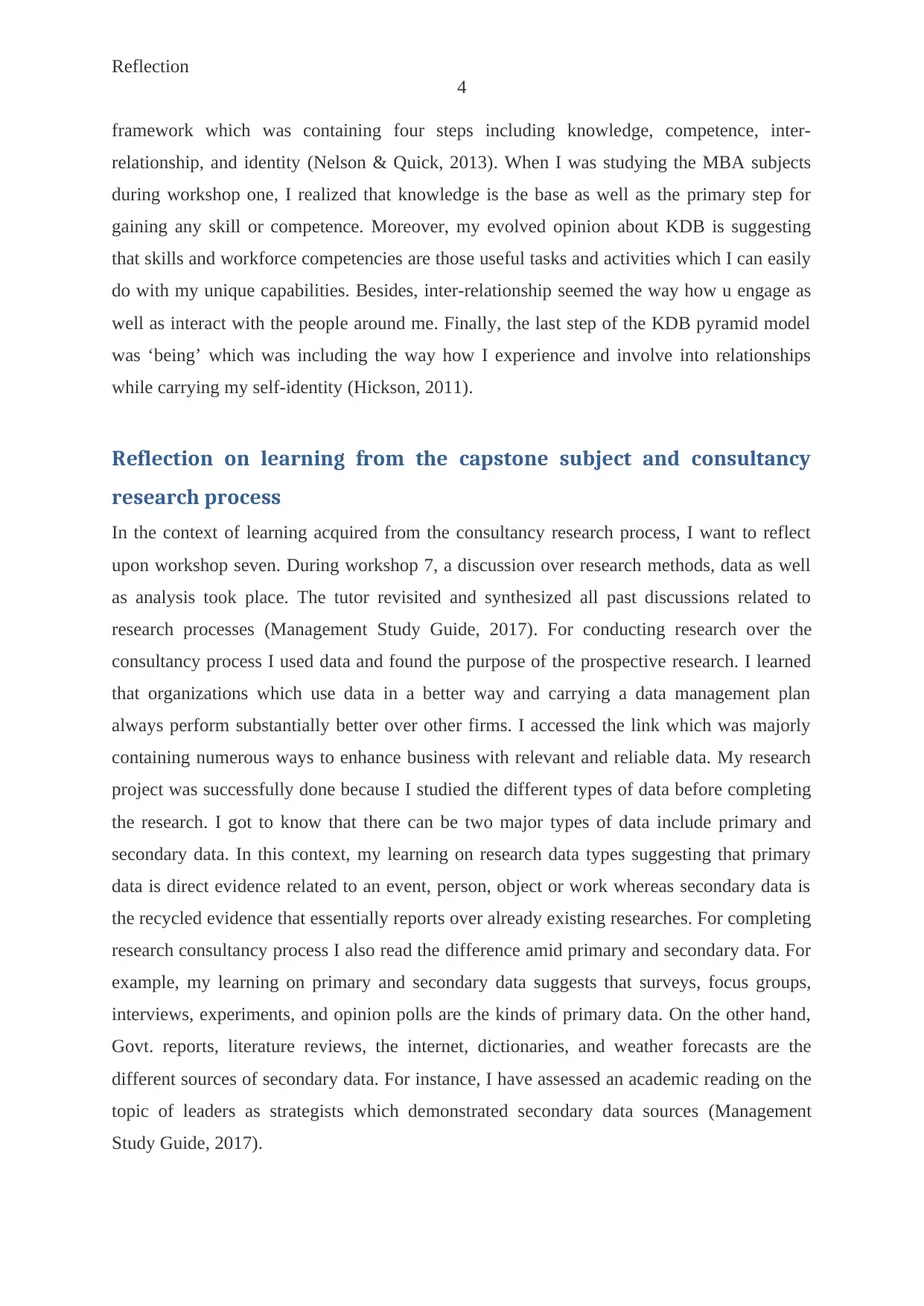
Reflection
4
framework which was containing four steps including knowledge, competence, inter-
relationship, and identity (Nelson & Quick, 2013). When I was studying the MBA subjects
during workshop one, I realized that knowledge is the base as well as the primary step for
gaining any skill or competence. Moreover, my evolved opinion about KDB is suggesting
that skills and workforce competencies are those useful tasks and activities which I can easily
do with my unique capabilities. Besides, inter-relationship seemed the way how u engage as
well as interact with the people around me. Finally, the last step of the KDB pyramid model
was ‘being’ which was including the way how I experience and involve into relationships
while carrying my self-identity (Hickson, 2011).
Reflection on learning from the capstone subject and consultancy
research process
In the context of learning acquired from the consultancy research process, I want to reflect
upon workshop seven. During workshop 7, a discussion over research methods, data as well
as analysis took place. The tutor revisited and synthesized all past discussions related to
research processes (Management Study Guide, 2017). For conducting research over the
consultancy process I used data and found the purpose of the prospective research. I learned
that organizations which use data in a better way and carrying a data management plan
always perform substantially better over other firms. I accessed the link which was majorly
containing numerous ways to enhance business with relevant and reliable data. My research
project was successfully done because I studied the different types of data before completing
the research. I got to know that there can be two major types of data include primary and
secondary data. In this context, my learning on research data types suggesting that primary
data is direct evidence related to an event, person, object or work whereas secondary data is
the recycled evidence that essentially reports over already existing researches. For completing
research consultancy process I also read the difference amid primary and secondary data. For
example, my learning on primary and secondary data suggests that surveys, focus groups,
interviews, experiments, and opinion polls are the kinds of primary data. On the other hand,
Govt. reports, literature reviews, the internet, dictionaries, and weather forecasts are the
different sources of secondary data. For instance, I have assessed an academic reading on the
topic of leaders as strategists which demonstrated secondary data sources (Management
Study Guide, 2017).
4
framework which was containing four steps including knowledge, competence, inter-
relationship, and identity (Nelson & Quick, 2013). When I was studying the MBA subjects
during workshop one, I realized that knowledge is the base as well as the primary step for
gaining any skill or competence. Moreover, my evolved opinion about KDB is suggesting
that skills and workforce competencies are those useful tasks and activities which I can easily
do with my unique capabilities. Besides, inter-relationship seemed the way how u engage as
well as interact with the people around me. Finally, the last step of the KDB pyramid model
was ‘being’ which was including the way how I experience and involve into relationships
while carrying my self-identity (Hickson, 2011).
Reflection on learning from the capstone subject and consultancy
research process
In the context of learning acquired from the consultancy research process, I want to reflect
upon workshop seven. During workshop 7, a discussion over research methods, data as well
as analysis took place. The tutor revisited and synthesized all past discussions related to
research processes (Management Study Guide, 2017). For conducting research over the
consultancy process I used data and found the purpose of the prospective research. I learned
that organizations which use data in a better way and carrying a data management plan
always perform substantially better over other firms. I accessed the link which was majorly
containing numerous ways to enhance business with relevant and reliable data. My research
project was successfully done because I studied the different types of data before completing
the research. I got to know that there can be two major types of data include primary and
secondary data. In this context, my learning on research data types suggesting that primary
data is direct evidence related to an event, person, object or work whereas secondary data is
the recycled evidence that essentially reports over already existing researches. For completing
research consultancy process I also read the difference amid primary and secondary data. For
example, my learning on primary and secondary data suggests that surveys, focus groups,
interviews, experiments, and opinion polls are the kinds of primary data. On the other hand,
Govt. reports, literature reviews, the internet, dictionaries, and weather forecasts are the
different sources of secondary data. For instance, I have assessed an academic reading on the
topic of leaders as strategists which demonstrated secondary data sources (Management
Study Guide, 2017).
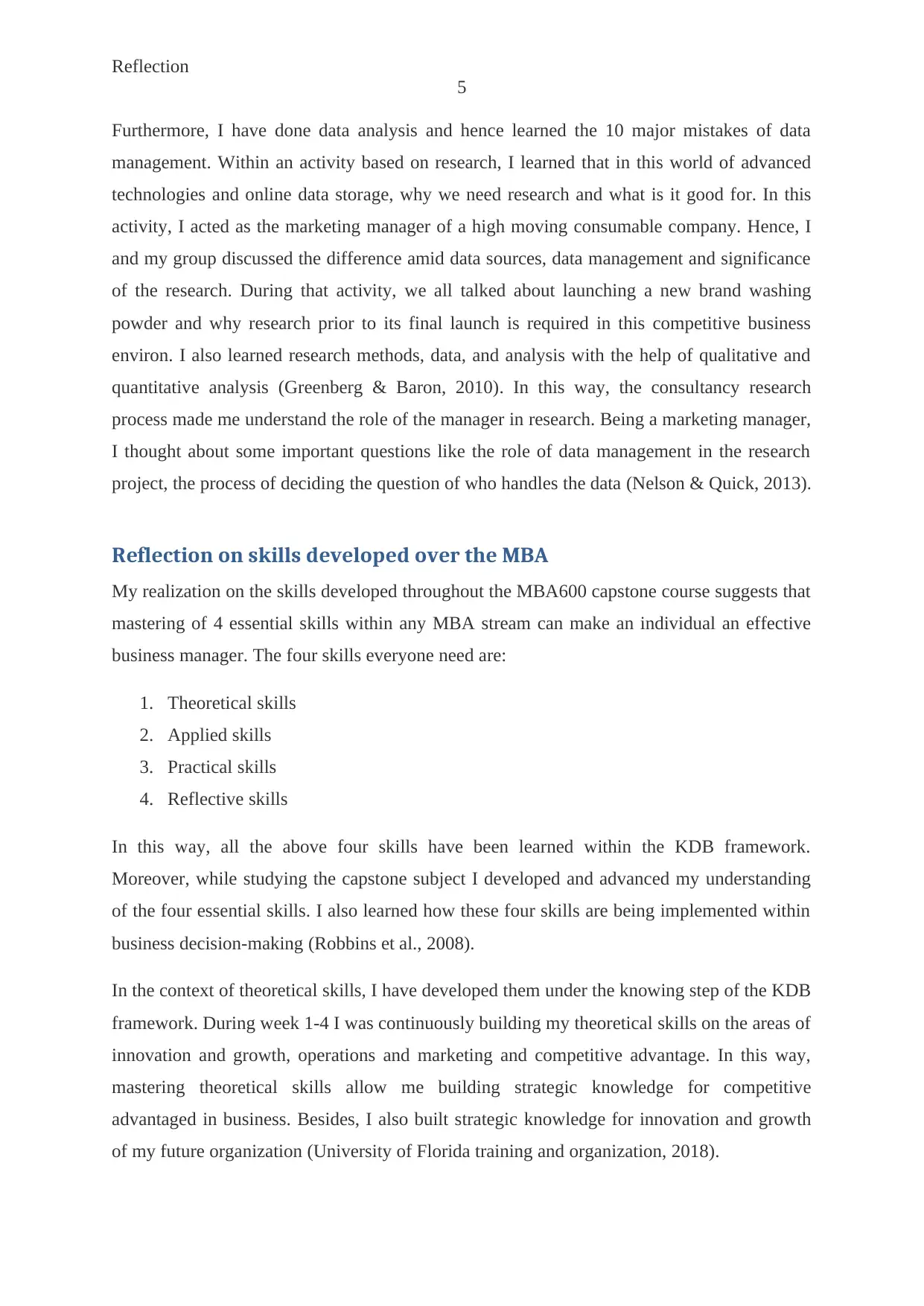
Reflection
5
Furthermore, I have done data analysis and hence learned the 10 major mistakes of data
management. Within an activity based on research, I learned that in this world of advanced
technologies and online data storage, why we need research and what is it good for. In this
activity, I acted as the marketing manager of a high moving consumable company. Hence, I
and my group discussed the difference amid data sources, data management and significance
of the research. During that activity, we all talked about launching a new brand washing
powder and why research prior to its final launch is required in this competitive business
environ. I also learned research methods, data, and analysis with the help of qualitative and
quantitative analysis (Greenberg & Baron, 2010). In this way, the consultancy research
process made me understand the role of the manager in research. Being a marketing manager,
I thought about some important questions like the role of data management in the research
project, the process of deciding the question of who handles the data (Nelson & Quick, 2013).
Reflection on skills developed over the MBA
My realization on the skills developed throughout the MBA600 capstone course suggests that
mastering of 4 essential skills within any MBA stream can make an individual an effective
business manager. The four skills everyone need are:
1. Theoretical skills
2. Applied skills
3. Practical skills
4. Reflective skills
In this way, all the above four skills have been learned within the KDB framework.
Moreover, while studying the capstone subject I developed and advanced my understanding
of the four essential skills. I also learned how these four skills are being implemented within
business decision-making (Robbins et al., 2008).
In the context of theoretical skills, I have developed them under the knowing step of the KDB
framework. During week 1-4 I was continuously building my theoretical skills on the areas of
innovation and growth, operations and marketing and competitive advantage. In this way,
mastering theoretical skills allow me building strategic knowledge for competitive
advantaged in business. Besides, I also built strategic knowledge for innovation and growth
of my future organization (University of Florida training and organization, 2018).
5
Furthermore, I have done data analysis and hence learned the 10 major mistakes of data
management. Within an activity based on research, I learned that in this world of advanced
technologies and online data storage, why we need research and what is it good for. In this
activity, I acted as the marketing manager of a high moving consumable company. Hence, I
and my group discussed the difference amid data sources, data management and significance
of the research. During that activity, we all talked about launching a new brand washing
powder and why research prior to its final launch is required in this competitive business
environ. I also learned research methods, data, and analysis with the help of qualitative and
quantitative analysis (Greenberg & Baron, 2010). In this way, the consultancy research
process made me understand the role of the manager in research. Being a marketing manager,
I thought about some important questions like the role of data management in the research
project, the process of deciding the question of who handles the data (Nelson & Quick, 2013).
Reflection on skills developed over the MBA
My realization on the skills developed throughout the MBA600 capstone course suggests that
mastering of 4 essential skills within any MBA stream can make an individual an effective
business manager. The four skills everyone need are:
1. Theoretical skills
2. Applied skills
3. Practical skills
4. Reflective skills
In this way, all the above four skills have been learned within the KDB framework.
Moreover, while studying the capstone subject I developed and advanced my understanding
of the four essential skills. I also learned how these four skills are being implemented within
business decision-making (Robbins et al., 2008).
In the context of theoretical skills, I have developed them under the knowing step of the KDB
framework. During week 1-4 I was continuously building my theoretical skills on the areas of
innovation and growth, operations and marketing and competitive advantage. In this way,
mastering theoretical skills allow me building strategic knowledge for competitive
advantaged in business. Besides, I also built strategic knowledge for innovation and growth
of my future organization (University of Florida training and organization, 2018).
⊘ This is a preview!⊘
Do you want full access?
Subscribe today to unlock all pages.

Trusted by 1+ million students worldwide
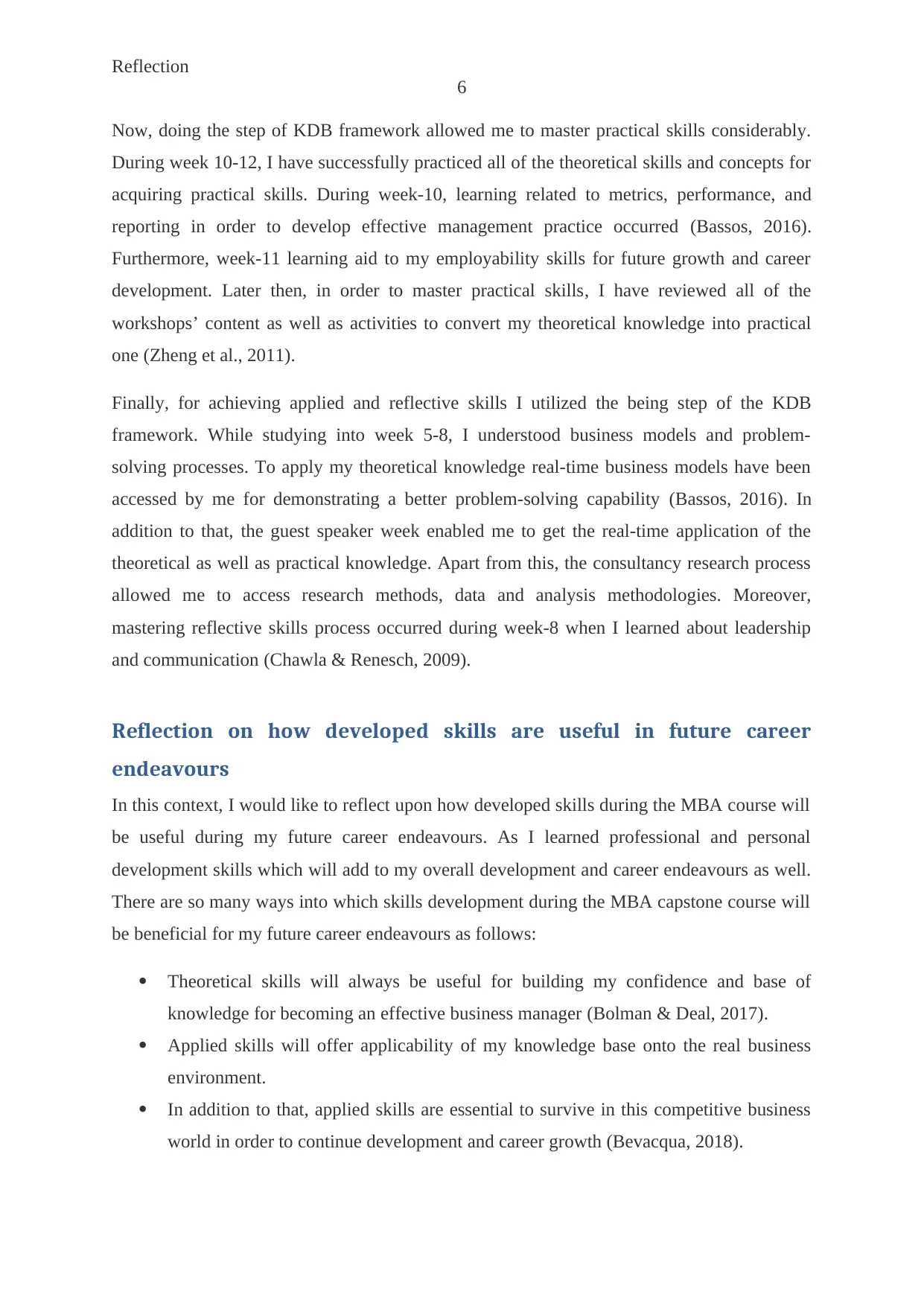
Reflection
6
Now, doing the step of KDB framework allowed me to master practical skills considerably.
During week 10-12, I have successfully practiced all of the theoretical skills and concepts for
acquiring practical skills. During week-10, learning related to metrics, performance, and
reporting in order to develop effective management practice occurred (Bassos, 2016).
Furthermore, week-11 learning aid to my employability skills for future growth and career
development. Later then, in order to master practical skills, I have reviewed all of the
workshops’ content as well as activities to convert my theoretical knowledge into practical
one (Zheng et al., 2011).
Finally, for achieving applied and reflective skills I utilized the being step of the KDB
framework. While studying into week 5-8, I understood business models and problem-
solving processes. To apply my theoretical knowledge real-time business models have been
accessed by me for demonstrating a better problem-solving capability (Bassos, 2016). In
addition to that, the guest speaker week enabled me to get the real-time application of the
theoretical as well as practical knowledge. Apart from this, the consultancy research process
allowed me to access research methods, data and analysis methodologies. Moreover,
mastering reflective skills process occurred during week-8 when I learned about leadership
and communication (Chawla & Renesch, 2009).
Reflection on how developed skills are useful in future career
endeavours
In this context, I would like to reflect upon how developed skills during the MBA course will
be useful during my future career endeavours. As I learned professional and personal
development skills which will add to my overall development and career endeavours as well.
There are so many ways into which skills development during the MBA capstone course will
be beneficial for my future career endeavours as follows:
Theoretical skills will always be useful for building my confidence and base of
knowledge for becoming an effective business manager (Bolman & Deal, 2017).
Applied skills will offer applicability of my knowledge base onto the real business
environment.
In addition to that, applied skills are essential to survive in this competitive business
world in order to continue development and career growth (Bevacqua, 2018).
6
Now, doing the step of KDB framework allowed me to master practical skills considerably.
During week 10-12, I have successfully practiced all of the theoretical skills and concepts for
acquiring practical skills. During week-10, learning related to metrics, performance, and
reporting in order to develop effective management practice occurred (Bassos, 2016).
Furthermore, week-11 learning aid to my employability skills for future growth and career
development. Later then, in order to master practical skills, I have reviewed all of the
workshops’ content as well as activities to convert my theoretical knowledge into practical
one (Zheng et al., 2011).
Finally, for achieving applied and reflective skills I utilized the being step of the KDB
framework. While studying into week 5-8, I understood business models and problem-
solving processes. To apply my theoretical knowledge real-time business models have been
accessed by me for demonstrating a better problem-solving capability (Bassos, 2016). In
addition to that, the guest speaker week enabled me to get the real-time application of the
theoretical as well as practical knowledge. Apart from this, the consultancy research process
allowed me to access research methods, data and analysis methodologies. Moreover,
mastering reflective skills process occurred during week-8 when I learned about leadership
and communication (Chawla & Renesch, 2009).
Reflection on how developed skills are useful in future career
endeavours
In this context, I would like to reflect upon how developed skills during the MBA course will
be useful during my future career endeavours. As I learned professional and personal
development skills which will add to my overall development and career endeavours as well.
There are so many ways into which skills development during the MBA capstone course will
be beneficial for my future career endeavours as follows:
Theoretical skills will always be useful for building my confidence and base of
knowledge for becoming an effective business manager (Bolman & Deal, 2017).
Applied skills will offer applicability of my knowledge base onto the real business
environment.
In addition to that, applied skills are essential to survive in this competitive business
world in order to continue development and career growth (Bevacqua, 2018).
Paraphrase This Document
Need a fresh take? Get an instant paraphrase of this document with our AI Paraphraser
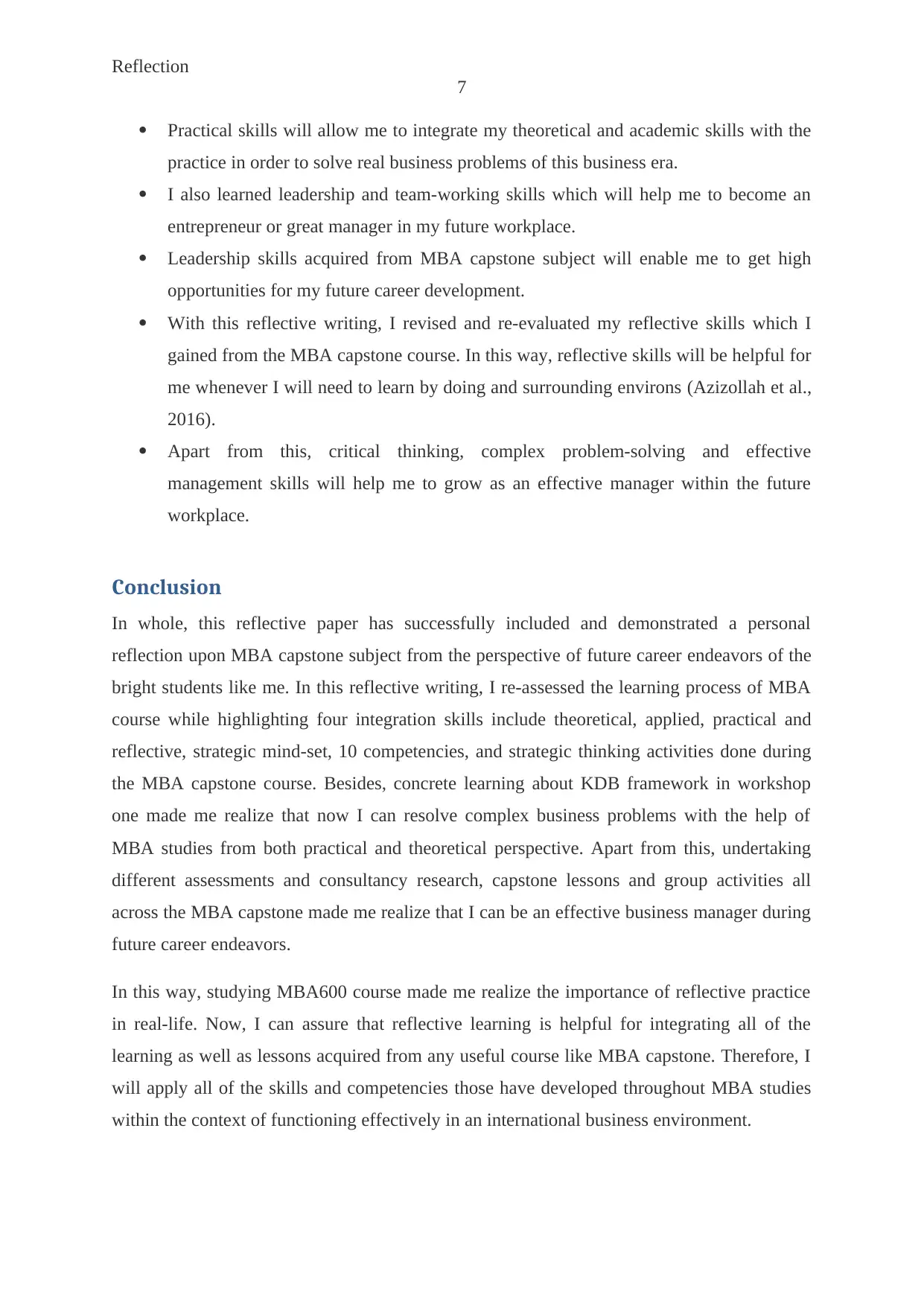
Reflection
7
Practical skills will allow me to integrate my theoretical and academic skills with the
practice in order to solve real business problems of this business era.
I also learned leadership and team-working skills which will help me to become an
entrepreneur or great manager in my future workplace.
Leadership skills acquired from MBA capstone subject will enable me to get high
opportunities for my future career development.
With this reflective writing, I revised and re-evaluated my reflective skills which I
gained from the MBA capstone course. In this way, reflective skills will be helpful for
me whenever I will need to learn by doing and surrounding environs (Azizollah et al.,
2016).
Apart from this, critical thinking, complex problem-solving and effective
management skills will help me to grow as an effective manager within the future
workplace.
Conclusion
In whole, this reflective paper has successfully included and demonstrated a personal
reflection upon MBA capstone subject from the perspective of future career endeavors of the
bright students like me. In this reflective writing, I re-assessed the learning process of MBA
course while highlighting four integration skills include theoretical, applied, practical and
reflective, strategic mind-set, 10 competencies, and strategic thinking activities done during
the MBA capstone course. Besides, concrete learning about KDB framework in workshop
one made me realize that now I can resolve complex business problems with the help of
MBA studies from both practical and theoretical perspective. Apart from this, undertaking
different assessments and consultancy research, capstone lessons and group activities all
across the MBA capstone made me realize that I can be an effective business manager during
future career endeavors.
In this way, studying MBA600 course made me realize the importance of reflective practice
in real-life. Now, I can assure that reflective learning is helpful for integrating all of the
learning as well as lessons acquired from any useful course like MBA capstone. Therefore, I
will apply all of the skills and competencies those have developed throughout MBA studies
within the context of functioning effectively in an international business environment.
7
Practical skills will allow me to integrate my theoretical and academic skills with the
practice in order to solve real business problems of this business era.
I also learned leadership and team-working skills which will help me to become an
entrepreneur or great manager in my future workplace.
Leadership skills acquired from MBA capstone subject will enable me to get high
opportunities for my future career development.
With this reflective writing, I revised and re-evaluated my reflective skills which I
gained from the MBA capstone course. In this way, reflective skills will be helpful for
me whenever I will need to learn by doing and surrounding environs (Azizollah et al.,
2016).
Apart from this, critical thinking, complex problem-solving and effective
management skills will help me to grow as an effective manager within the future
workplace.
Conclusion
In whole, this reflective paper has successfully included and demonstrated a personal
reflection upon MBA capstone subject from the perspective of future career endeavors of the
bright students like me. In this reflective writing, I re-assessed the learning process of MBA
course while highlighting four integration skills include theoretical, applied, practical and
reflective, strategic mind-set, 10 competencies, and strategic thinking activities done during
the MBA capstone course. Besides, concrete learning about KDB framework in workshop
one made me realize that now I can resolve complex business problems with the help of
MBA studies from both practical and theoretical perspective. Apart from this, undertaking
different assessments and consultancy research, capstone lessons and group activities all
across the MBA capstone made me realize that I can be an effective business manager during
future career endeavors.
In this way, studying MBA600 course made me realize the importance of reflective practice
in real-life. Now, I can assure that reflective learning is helpful for integrating all of the
learning as well as lessons acquired from any useful course like MBA capstone. Therefore, I
will apply all of the skills and competencies those have developed throughout MBA studies
within the context of functioning effectively in an international business environment.
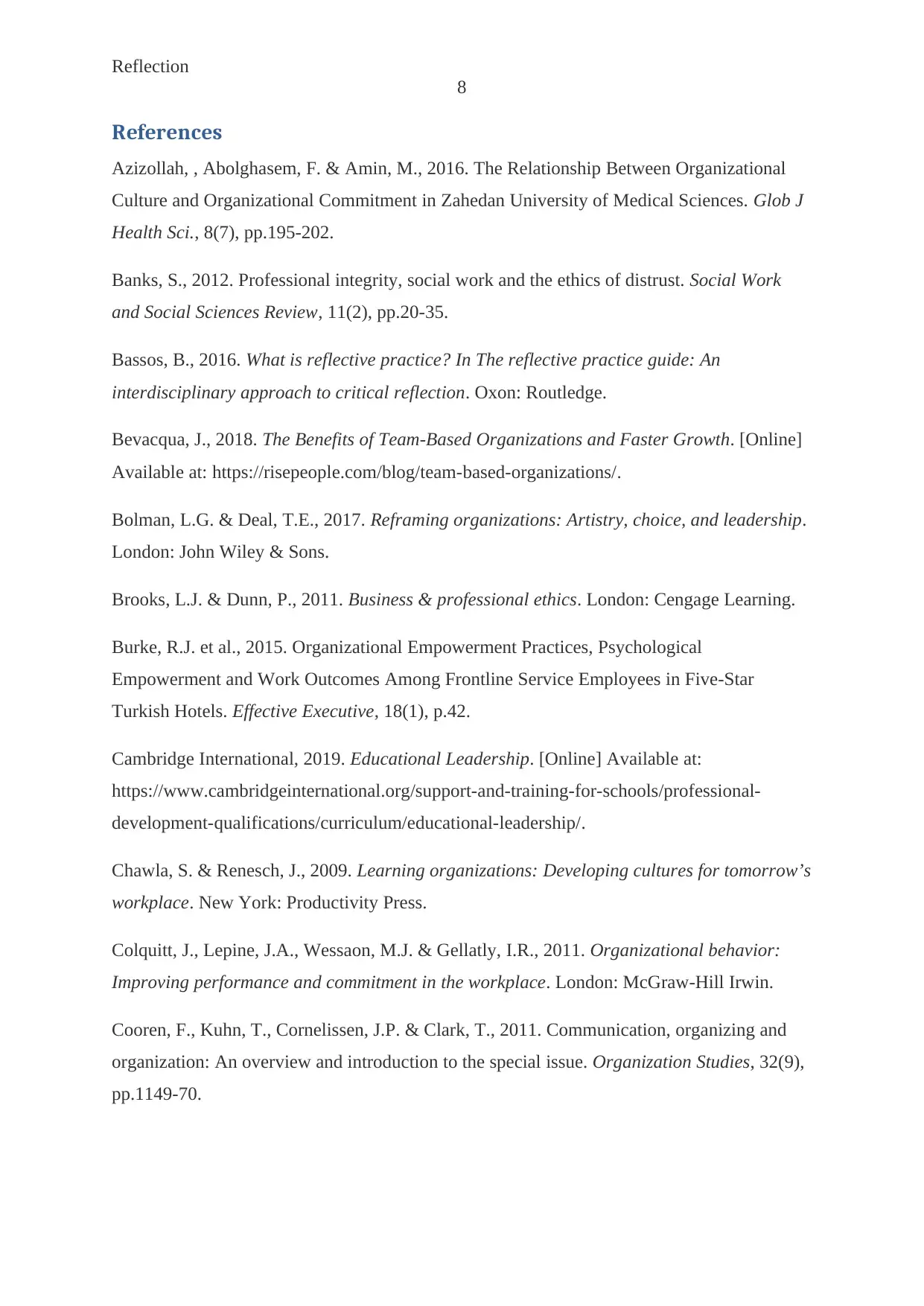
Reflection
8
References
Azizollah, , Abolghasem, F. & Amin, M., 2016. The Relationship Between Organizational
Culture and Organizational Commitment in Zahedan University of Medical Sciences. Glob J
Health Sci., 8(7), pp.195-202.
Banks, S., 2012. Professional integrity, social work and the ethics of distrust. Social Work
and Social Sciences Review, 11(2), pp.20-35.
Bassos, B., 2016. What is reflective practice? In The reflective practice guide: An
interdisciplinary approach to critical reflection. Oxon: Routledge.
Bevacqua, J., 2018. The Benefits of Team-Based Organizations and Faster Growth. [Online]
Available at: https://risepeople.com/blog/team-based-organizations/.
Bolman, L.G. & Deal, T.E., 2017. Reframing organizations: Artistry, choice, and leadership.
London: John Wiley & Sons.
Brooks, L.J. & Dunn, P., 2011. Business & professional ethics. London: Cengage Learning.
Burke, R.J. et al., 2015. Organizational Empowerment Practices, Psychological
Empowerment and Work Outcomes Among Frontline Service Employees in Five-Star
Turkish Hotels. Effective Executive, 18(1), p.42.
Cambridge International, 2019. Educational Leadership. [Online] Available at:
https://www.cambridgeinternational.org/support-and-training-for-schools/professional-
development-qualifications/curriculum/educational-leadership/.
Chawla, S. & Renesch, J., 2009. Learning organizations: Developing cultures for tomorrow’s
workplace. New York: Productivity Press.
Colquitt, J., Lepine, J.A., Wessaon, M.J. & Gellatly, I.R., 2011. Organizational behavior:
Improving performance and commitment in the workplace. London: McGraw-Hill Irwin.
Cooren, F., Kuhn, T., Cornelissen, J.P. & Clark, T., 2011. Communication, organizing and
organization: An overview and introduction to the special issue. Organization Studies, 32(9),
pp.1149-70.
8
References
Azizollah, , Abolghasem, F. & Amin, M., 2016. The Relationship Between Organizational
Culture and Organizational Commitment in Zahedan University of Medical Sciences. Glob J
Health Sci., 8(7), pp.195-202.
Banks, S., 2012. Professional integrity, social work and the ethics of distrust. Social Work
and Social Sciences Review, 11(2), pp.20-35.
Bassos, B., 2016. What is reflective practice? In The reflective practice guide: An
interdisciplinary approach to critical reflection. Oxon: Routledge.
Bevacqua, J., 2018. The Benefits of Team-Based Organizations and Faster Growth. [Online]
Available at: https://risepeople.com/blog/team-based-organizations/.
Bolman, L.G. & Deal, T.E., 2017. Reframing organizations: Artistry, choice, and leadership.
London: John Wiley & Sons.
Brooks, L.J. & Dunn, P., 2011. Business & professional ethics. London: Cengage Learning.
Burke, R.J. et al., 2015. Organizational Empowerment Practices, Psychological
Empowerment and Work Outcomes Among Frontline Service Employees in Five-Star
Turkish Hotels. Effective Executive, 18(1), p.42.
Cambridge International, 2019. Educational Leadership. [Online] Available at:
https://www.cambridgeinternational.org/support-and-training-for-schools/professional-
development-qualifications/curriculum/educational-leadership/.
Chawla, S. & Renesch, J., 2009. Learning organizations: Developing cultures for tomorrow’s
workplace. New York: Productivity Press.
Colquitt, J., Lepine, J.A., Wessaon, M.J. & Gellatly, I.R., 2011. Organizational behavior:
Improving performance and commitment in the workplace. London: McGraw-Hill Irwin.
Cooren, F., Kuhn, T., Cornelissen, J.P. & Clark, T., 2011. Communication, organizing and
organization: An overview and introduction to the special issue. Organization Studies, 32(9),
pp.1149-70.
⊘ This is a preview!⊘
Do you want full access?
Subscribe today to unlock all pages.

Trusted by 1+ million students worldwide
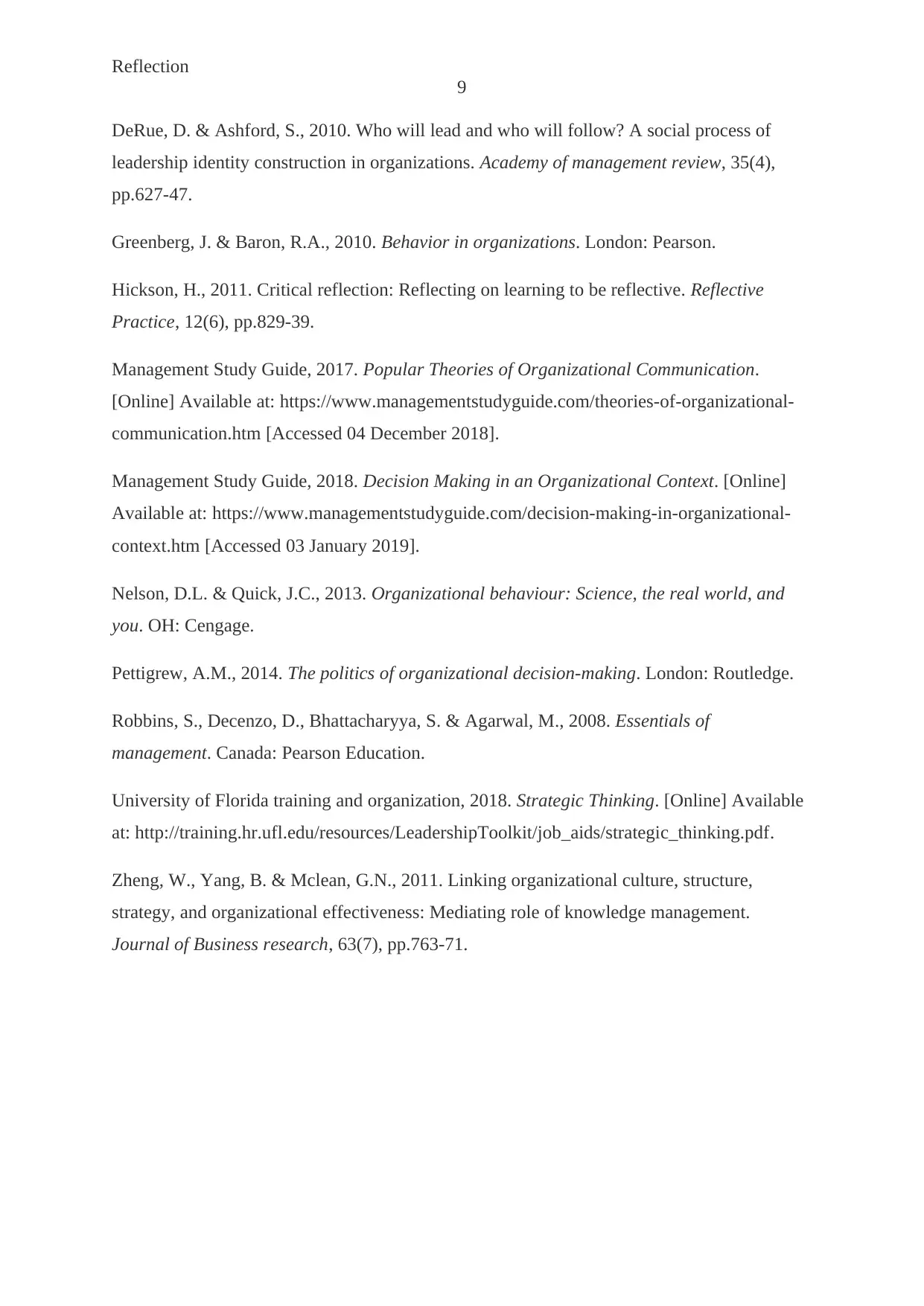
Reflection
9
DeRue, D. & Ashford, S., 2010. Who will lead and who will follow? A social process of
leadership identity construction in organizations. Academy of management review, 35(4),
pp.627-47.
Greenberg, J. & Baron, R.A., 2010. Behavior in organizations. London: Pearson.
Hickson, H., 2011. Critical reflection: Reflecting on learning to be reflective. Reflective
Practice, 12(6), pp.829-39.
Management Study Guide, 2017. Popular Theories of Organizational Communication.
[Online] Available at: https://www.managementstudyguide.com/theories-of-organizational-
communication.htm [Accessed 04 December 2018].
Management Study Guide, 2018. Decision Making in an Organizational Context. [Online]
Available at: https://www.managementstudyguide.com/decision-making-in-organizational-
context.htm [Accessed 03 January 2019].
Nelson, D.L. & Quick, J.C., 2013. Organizational behaviour: Science, the real world, and
you. OH: Cengage.
Pettigrew, A.M., 2014. The politics of organizational decision-making. London: Routledge.
Robbins, S., Decenzo, D., Bhattacharyya, S. & Agarwal, M., 2008. Essentials of
management. Canada: Pearson Education.
University of Florida training and organization, 2018. Strategic Thinking. [Online] Available
at: http://training.hr.ufl.edu/resources/LeadershipToolkit/job_aids/strategic_thinking.pdf.
Zheng, W., Yang, B. & Mclean, G.N., 2011. Linking organizational culture, structure,
strategy, and organizational effectiveness: Mediating role of knowledge management.
Journal of Business research, 63(7), pp.763-71.
9
DeRue, D. & Ashford, S., 2010. Who will lead and who will follow? A social process of
leadership identity construction in organizations. Academy of management review, 35(4),
pp.627-47.
Greenberg, J. & Baron, R.A., 2010. Behavior in organizations. London: Pearson.
Hickson, H., 2011. Critical reflection: Reflecting on learning to be reflective. Reflective
Practice, 12(6), pp.829-39.
Management Study Guide, 2017. Popular Theories of Organizational Communication.
[Online] Available at: https://www.managementstudyguide.com/theories-of-organizational-
communication.htm [Accessed 04 December 2018].
Management Study Guide, 2018. Decision Making in an Organizational Context. [Online]
Available at: https://www.managementstudyguide.com/decision-making-in-organizational-
context.htm [Accessed 03 January 2019].
Nelson, D.L. & Quick, J.C., 2013. Organizational behaviour: Science, the real world, and
you. OH: Cengage.
Pettigrew, A.M., 2014. The politics of organizational decision-making. London: Routledge.
Robbins, S., Decenzo, D., Bhattacharyya, S. & Agarwal, M., 2008. Essentials of
management. Canada: Pearson Education.
University of Florida training and organization, 2018. Strategic Thinking. [Online] Available
at: http://training.hr.ufl.edu/resources/LeadershipToolkit/job_aids/strategic_thinking.pdf.
Zheng, W., Yang, B. & Mclean, G.N., 2011. Linking organizational culture, structure,
strategy, and organizational effectiveness: Mediating role of knowledge management.
Journal of Business research, 63(7), pp.763-71.
1 out of 10
Related Documents
Your All-in-One AI-Powered Toolkit for Academic Success.
+13062052269
info@desklib.com
Available 24*7 on WhatsApp / Email
![[object Object]](/_next/static/media/star-bottom.7253800d.svg)
Unlock your academic potential
Copyright © 2020–2026 A2Z Services. All Rights Reserved. Developed and managed by ZUCOL.



